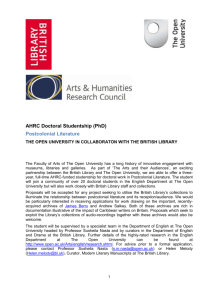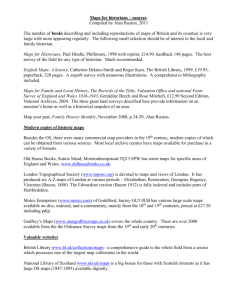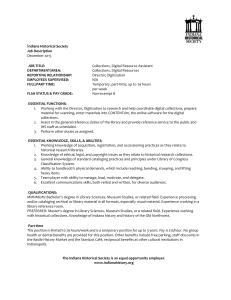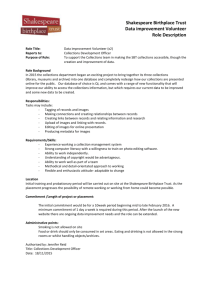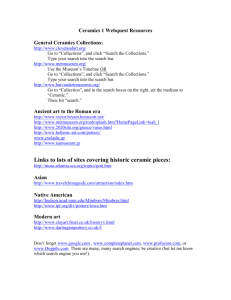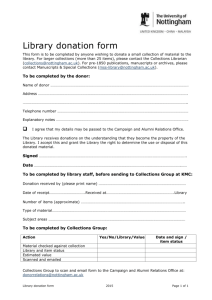The Open University and Oxford University Research Studentship in
advertisement
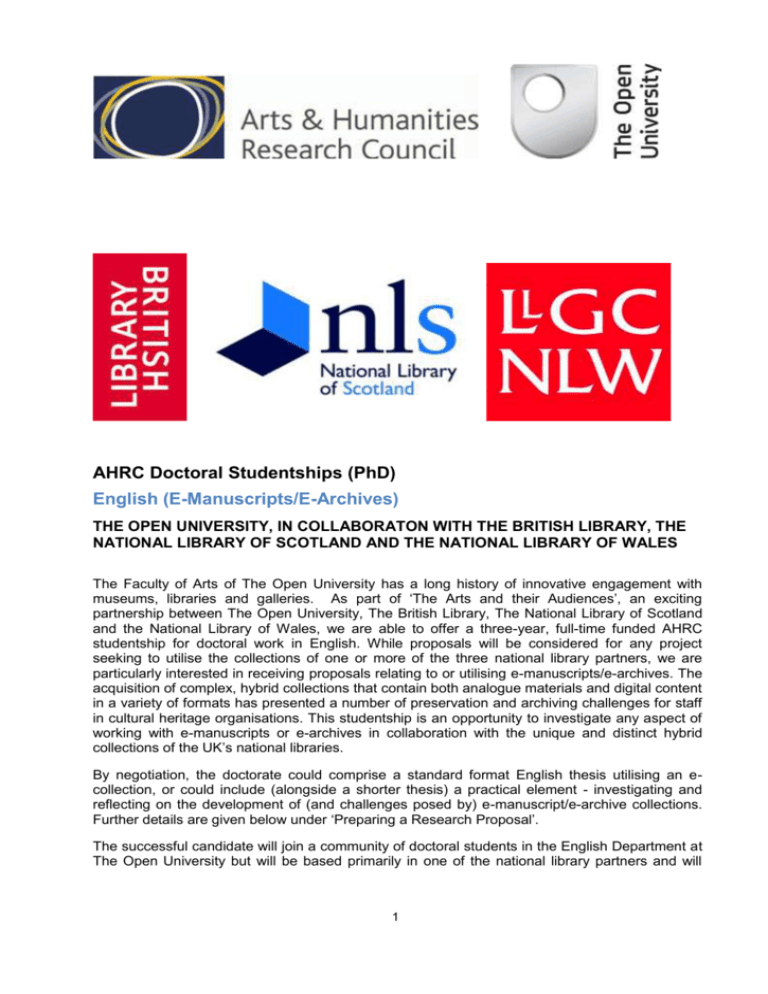
AHRC Doctoral Studentships (PhD) English (E-Manuscripts/E-Archives) THE OPEN UNIVERSITY, IN COLLABORATON WITH THE BRITISH LIBRARY, THE NATIONAL LIBRARY OF SCOTLAND AND THE NATIONAL LIBRARY OF WALES The Faculty of Arts of The Open University has a long history of innovative engagement with museums, libraries and galleries. As part of ‘The Arts and their Audiences’, an exciting partnership between The Open University, The British Library, The National Library of Scotland and the National Library of Wales, we are able to offer a three-year, full-time funded AHRC studentship for doctoral work in English. While proposals will be considered for any project seeking to utilise the collections of one or more of the three national library partners, we are particularly interested in receiving proposals relating to or utilising e-manuscripts/e-archives. The acquisition of complex, hybrid collections that contain both analogue materials and digital content in a variety of formats has presented a number of preservation and archiving challenges for staff in cultural heritage organisations. This studentship is an opportunity to investigate any aspect of working with e-manuscripts or e-archives in collaboration with the unique and distinct hybrid collections of the UK’s national libraries. By negotiation, the doctorate could comprise a standard format English thesis utilising an ecollection, or could include (alongside a shorter thesis) a practical element - investigating and reflecting on the development of (and challenges posed by) e-manuscript/e-archive collections. Further details are given below under ‘Preparing a Research Proposal’. The successful candidate will join a community of doctoral students in the English Department at The Open University but will be based primarily in one of the national library partners and will 1 work closely with staff and collections there. All three library partners have large (and growing) emanuscript/e-archive collections, and the successful candidate will have access to advice and collections from all three partner institutions. The student will be supervised by a specialist team in the Department of English at The Open University (likely also to include a Digital Humanities specialist) and by curators at the primary partner institutions. Further details of the highly-rated research in the English Department at The Open University can be found at http://www.open.ac.uk/Arts/english/research.shtml. For advice prior to a formal application, please contact Paul Lawrence, Associate Dean Research, The Open University (paul.lawrence@open.ac.uk) and (for advice related to the Library at which you wish to base your studentship) Lorna Hughes, Chair in Digital Collections, National Library of Wales (Lorna.Hughes@llgc.org.uk); Jeremy Leighton John, Curator eMANUSCRIPTS, & Rachel Foss, Lead Curator Modern Literary Manuscripts, British Library (jeremy.john@bl.uk & Rachel.Foss@bl.uk); Robin Smith, Head of Collections and Interpretation, National Library of Scotland (r.smith@nls.uk). RESEARCH ENVIRONMENTS Student will be registered for a PhD within the English Department of The Open University. English is one of seven departments in the Faculty of Arts, which is internationally recognized for innovative research across the range of its subject areas. For more information about the Arts Faculty see: http://www.open.ac.uk/Arts/index.html. Much work is focused on the United Kingdom (with strong interests in the national histories and cultures of Ireland, Scotland and Wales) but there is also considerable expertise relating to continental Europe, Africa and the Indian subcontinent. Several major AHRC-funded projects are based in the Faculty. There is a strong vision for developing successful interdisciplinary and multidisciplinary research, and a commitment to ensuring that our research effectively informs not only our own teaching but a wider process of knowledge exchange with cultural and heritage partners. The Faculty also hosts a vibrant programme of Digital Humanities Research. For further detail on Digital Humanities at The Open University see: http://www.open.ac.uk/Arts/digital-humanities/index.shtml. The Open University offers an intellectually-exciting research environment at its main Walton Hall campus in Milton Keynes, where all the main University facilities are sited. This environment is supported by a network of 13 regional centres (including Edinburgh, Cardiff and London) where research-active members of the Arts Faculty also work. The University achieved the second largest climb in UK research rankings in the 2008 Research Assessment Exercise, with more than 60% of its research rated as ‘internationally excellent’ (3*) and 14% as ‘world-leading’ (4*). The Open University’s freely-accessible repository of research publications, Open Research Online, is now the eighth largest university repository of its kind in the UK. It averages 32,000 individual site visits per month, and has had 1.5 million visitors (from 180 countries) since 2006. It includes more than 15,275 Open University research outputs. The University’s iTunesU site (launched in 2008) includes research content and there have been more than 25,000,000 discrete downloads since then. Open University research engages with some of the major issues facing contemporary society. Via our exceptional presence in the nations and regions, augmented by our close links with the BBC and other media outlets, our research informs public opinion and policy, and promotes debate and engagement with key questions of the day. Given collaborative nature of the studentship, it is likely that (while registered at The Open University) the successful candidate will spend much of their time based primarily in one of the three partner institutions, with the option to spend time on secondment in each of the others. The National Library of Wales has a research programme in digital collections that is a focus for digital humanities in Wales, and the basis of the development of significant new national and international collaborations. The research focus of the research programme in digital collections has two thematic aspects: developing an understanding of use of our existing NLW digital content, and then using this knowledge to identify ways that the content can be enhanced and 2 made more valuable for use in research, teaching, or community engagement; and building projects that develop new digital content that addresses specific research or education needs, in partnership with academics and other key stakeholders. This research addresses all aspects of digital research methods in the arts and humanities, taking advantage of the convergent practices that are embedded in digital humanities to add impact and value to digital collections of Wales, and to increase their use in transforming scholarship across the disciplines. The programme has embarked on a series of activities to develop innovative approaches to using the digital content created by NLW through the application of ICT tools and methods for research, and the communication of this research in collaboration with scholars accross the disciplines to effect the development of new research, and generate new research questions. The British Library has been collecting personal digital archives since 2000, and appointed a Curator of eMANUSCRIPTS for these collections in 2003. Personal digital objects may reside on floppy disks, optical discs, hard drives and in the cloud on remote servers. The library led the AHRC Digital Lives Research Project to investigate aspects of personal digital archives across the lifecycle: from the perspectives of creator, archivist and scholar. An internal project is currently putting some of the findings into practice: Personal Digital Manuscripts Project. The library has pioneered the use of digital forensics as a means of helping to ensure authenticity, privacy protection and reliable analysis. Many collections are hybrid in nature, involving both paper and digital objects, and one of the challenges is to find efficient ways to handle them in a seamless way: through for example digital inventory on reception including digital imaging of objects as part of the registration process, and the marshalling of metadata. Another aspect of digital curation that has come to the fore at the British Library is referred to as Enhanced Curation, the aim of which is to capture as much as possible of the context of an archive, most notably through high resolution panoramic photography but also through audio and video interviews and tours, and through the documentation of an individual’s personal library. The digital archive collections are very diverse in nature and in size. Significant literary archives are the Wendy Cope Archive and the Harold Pinter Archive, both predominantly consisting of emails. The library is exploring a variety of analytical and visualisation tools including networks for the scholarly and curatorial understanding of personal archives in the digital era. The National Library of Scotland The National Library of Scotland, the largest research library in Scotland, is one of six legal deposit libraries in the UK and the Republic of Ireland. The legal deposit privilege allows the library to claim a free copy of books, music and some electronic materials issued to the public in the UK and the Republic of Ireland. However, sound recordings are excluded from this privilege and NLS acquires sound recordings as well as foreign music publications and antiquarian music publications through donation and purchase. The Library has extensive digital holdings (see digital.nls.uk) which include digitised film and music, archived websites as well as electronic versions of printed sources and manuscripts and other data acquired in electronic format. DOCTORAL TRAINING AT THE OPEN UNIVERSITY The Open University has an extensive doctoral studies programme, with over 1,200 current postgraduate research students (c.625 studying full-time on campus, the rest studying part-time, dispersed throughout the United Kingdom and combining research degrees with work responsibilities). The University has therefore developed a rigorous yet flexible portfolio of skills training for postgraduate research students. The programme has a clear focus on transferable skills, and Arts and Humanities research participate fully in the programme. The Arts Faculty currently has 110 postgraduate research students, registered either for a PhD or for an MPhil prior to doctoral study. The Open University Research School provides an induction programme for new research students and a training programme for students. The student will receive training in for example: 3 bibliographical databases and other IT skills and in managing a research project through its different stages. The Arts Faculty provides additional study skills training days focussed on the particular needs of Arts and Humanities students and The Open University Library offers specially tailored sessions. For further information about study at The Open University, see the research degree prospectus, which can be downloaded from http://www.open.ac.uk/research/research-degrees/index.php. Given the nature of the collaborative project, however, it is likely that the successful candidate will be based primarily at (or near) either The British Library, The National Library of Scotland or The National Library of Wales. These collaborative partners will provide facilities as appropriate to the project, with the support to be provided being discussed and agreed following interview. Depending on the type of research undertaken, the collaborative partner may also supply an advisor or supervisor from among Library staff. PREPARING A RESEARCH PROPOSAL In addition to completing an application form you will need to supply a research proposal. This should set out (maximum 1500 words) your ideas for the research you would like to undertake during your doctoral studies. The outcome of the research could take the form of a conventional PhD thesis, but the University is prepared to consider supervising work which investigates and reflects more broadly on the opportunities and challenges raised by e-manuscript/e-archive research. The ‘thesis’ would then be likely to consist of a physical or practical output pertaining to the collections investigated, along with a commentary (shorter than the conventional PhD thesis) on the methodologies and strategies that have been used to create it. In allowing this type of output The Open University and its collaborating partners hope that the studentship will produce new knowledge pertinent to research in English, and new ways of understanding emanuscript/archive collections and their importance to academic and non-academic audiences, media professionals and amateur interest groups. In framing a proposal, candidates are strongly advised first to contact the library partner they would wish to work most closely with, but broad general guidance is given below. There is no set format for a proposal but you should initially conduct a survey of existing work in your chosen field, and make sure you include: 1. The title of your project 2. A clear summary of the proposed research. Drawing on your own review of the literature already existing in your field, you need to set out the questions you wish to pose and answer. Your summary should also cover the following points: Why is this an important subject? (A thesis needs to add something to the sum of our knowledge – how would yours do this?) What is new about your thesis (this could be new questions posed, new sources previously not used, a new approach etc.) How does your thesis relate to other publications in the field? Do you plan to confirm certain points of view, or to refute them? What sources might you need to use? Can you give an indication of the methodology and time frame you will propose for your research? 3. A Bibliography. You need not have read everything you list here, but you should give an indication of your awareness of the primary and secondary sources available to you. 4. In addition, your proposal should indicate how you feel your project might add value to or expose the collections of the library you propose to work most closely with. 4 Stipend, expenses and facilities The studentship carries a maintenance grant at the level set by the research councils (expected to be £13,590 per annum from 12/13) as well as covering tuition fees. There is an allowance for training and project-related research costs subject to a standard £1,000 annual limit, with preapproval of specific research plans. The successful candidate will have desk space in the Faculty of Arts in Milton Keynes and will be provided with a notebook computer. The Open University has exceptional collections of online and digital library resources, as well as access to all the usual facilities of a research-intensive University. Requirements It is essential that the successful candidate has: Good academic qualifications in an Arts and Humanities subject (ie a 1st or 2:i degree from a UK institution or equivalent from a non-UK institution and/or a Masters degree) Demonstrable ability to produce high-level academic writing Evidence of the self-discipline and organizational skills required to complete a major academic project in three, or at most four, years Willingness to participate in the broader intellectual communities of The Open University and its collaborative library partners In addition, it is desirable that the successful candidate has: a Masters degree in a relevant Arts and Humanities subject How to apply: Applications are through the standard Open University research degree application form online at http://www.open.ac.uk/research/research-degrees/index.php. For practical advice on the applications procedure, contact Michelle McGregor in the Research Degrees Team (research-degrees-arts@open.ac.uk) 01908 653806) or the Faculty of Arts: 01908 652092 (Anne Ford at a.ford@open.ac.uk). For advice on the academic aspects of applying, please contact either Paul Lawrence or the library contacts as detailed above. Please note that this studentship is subject to the eligibility regulations for AHRC awards: http://www.ahrc.ac.uk/SiteCollectionDocuments/Student-Funding-Guide.pdf. CLOSING DATE FOR APPLICATIONS: 31 March 2013 INTERVIEWS ANTICIPATED: w/c 22 April 2013 IT IS EXPECTED THAT THE STUDENTSHIP WILL START IN OCTOBER 2013. Equal Opportunity is University Policy. 5


